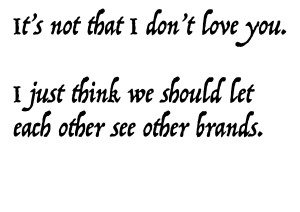There’s a lovely TED talk featuring a chat between Lily Tomlin and Jane Fonda.
It talks about the genuine benefits of friendships.
Proper friendships.
Friendships based on shared experiences and support and laughter.
It got me thinking about the communities we try and build for products and services and brands.
Research suggests the numbers of total brand loyalists who only buy one brand are surprisingly few.
People who “only buy Adidas” will sometimes buy Nike.
People who “only drink Coke” will sometimes buy Pepsi.
People who “only stay at Hyatt” will sometimes stay at the Intercontinental.
As much as we want to create the perfect customer who only buys from us, the data suggests this ideal brand loyalist lives with Santa and is best mates with the Tooth Fairy.
I think it’s because a lot of brands aren’t loyal to their customers.
Or don’t have ways of showing they’re loyal to their customers.
Many brand managers have tried to do this by building a community.
It was seen as a way of building preference and, hopefully, loyalty.
But it seems “building a community” doesn’t equate to “anything”.
While the intent is to build a real community founded on a common love or passion, it often turns into a bunch of people with a desire for getting free stuff.
And there’s nothing wrong with that, as long as we acknowledge why people are doing what they’re doing.
People like loyalty programs.
People like getting a bargain.
But (according to Bond Brand Loyalty) 58% of customers won’t join a loyalty program because they value their privacy too much.
And, according to Forbes, a survey sponsored by AisleBuyer in the States says a staggering 75% of people would swap purchase intent if prompted (via their mobile) by a discount offer or promotion at point of purchase.
Turns out when someone says they’re a brand loyalist, they actually mean they’re brand loyal-ish.
It’s not a bad thing. It’s just the way things are.
In the above talk, Jane Fonda points out that she’s more emotionally open with her real friends.
Are commercial relationships emotionally open?
Are they honest? Are they trustworthy? Are the brands loyal to their customers?
Are the brands prepared to take sides?
And, if one partner in a relationship can’t be honest and trustworthy and loyal, why should the other?
My point is a simple one.
We need to concentrate on doing the hard things right.
We have to try and build loyalty and preference for the stuff we sell.
We have to prove relevance and difference and we have to do it with a smile.
We have to use whatever technology we can to get the consumer in a state of mind where they’re prepared to buy our stuff.
We should have forums and build fan bases and produce posters and radio spots and great websites and intriguing experiences and great service and all the other incredibly hard stuff we need to do to sell whatever it is we’re selling.
We just can’t go on believing our customers aren’t seeing other brands.


Leave A Comment